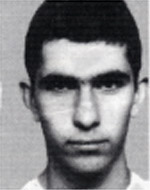Roshgold, Barak
Was born on December 22, 1960 in the United States, where his parents stayed because of their studies, and was two years old when he immigrated with his parents to Israel in 1962. His family lived in northern Tel Aviv, He graduated from elementary school and studied at the Lady Davis High School, where he was active in the Scouts movement and reached the rank of center of the President’s tribe in January 1979. Barak joined the IDF in January 1979 and served in the Artillery Corps. Barak underwent general training, was sent to professional courses as a gunner, excelled in a commanders’ course and was recommended for an officer’s course. In June 1980, he completed a basic officer’s course and rose to the rank of lieutenant colonel. Both of these courses he graduated with honors. He was assigned to serve as an instructor in an officers’ course, and his commanders expressed his opinion of him: “He is a brilliant officer with an exceptional professional ability – responsible, considerate, thorough, calm, with good interpersonal relations and a high professional level.” In January 1982, Barak completed his regular service and volunteered to serve for another year in the career army, beginning with R & D in the Artillery Corps and later as the commander of an artillery battery in the north, with the rank of lieutenant. When the Peace for Galilee War broke out, Barak left with his unit to the front in Lebanon. On the morning of the second day of the war, June 7, 1982, during the battle for the city of Tire, he moved with his unit on the Tzur bypass road. Near the town of Burj al-Shamali, the battery under his command encountered a terrorist ambush, and when he was exposed in the turret, the commander was hit by an RPG missile. And killed. Barak was 21 years old when he fell. Barak was laid to rest at the military cemetery in Kiryat Shaul in Tel Aviv. He left behind his parents, two sisters and a brother. After his death, Barak was promoted to the rank of captain. The defense minister wrote in a letter of condolence to his family: “Captain Barak gave his life for his homeland, and served in the Artillery Corps, and his commanders defined him as an officer of a very high level of professionalism, quiet, responsible, and caring for his subordinates. In his personality, Barak was a fitting example of an officer in the IDF. He was accepted by his comrades and subordinates. “The commander of his unit wrote to his family:” Barak did most of his career in the battalion. After fulfilling his duties very well, he went on a training course in the officers’ course at Shivta. From there he returned to serve as a battery commander in an artillery course. He was Simcha for the job and invested his best efforts and energy for the success of his soldiers. All along the way he was a very responsible, disciplined officer. His demands from those around him were high, and he knew how to get the most out of them. He filled every position with honors, and was an example of other officers in the battalion in his behavior. Barak was a quiet type, and did everything he did with his battery. He educated his soldiers to be good soldiers and commanders with healthy foundations. “
